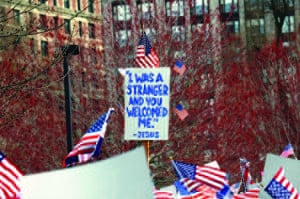
I Was An Undocumented Immigrant
It is a curious thing, the border—a fence, a few feet high, made of scrap metal, and with two different realities on each side. It divides everything, and it divides nothing. On this particular afternoon, as we inched our way towards the wall, my palms turned sweaty, and my heart pounded like a drum. For so many years I had dreamed of living and working on the other side. And now, if I could only make it across, I would be on my way.
I had been across before, as a tourist and a student, and had heard many stories about what they think of us. They have a lot to blame us for, you know—the violence, the lack of security, and many economic troubles. Corruption of their traditional values, our drunkenness and promiscuity, even the grating accent with which we abuse their language. Even without these reasons, they could despise us simply for not being like them, the way so many people do.
All of these knowings spun through my brain as I inched closer to the border. But when we finally reached the crossing, the guards looked at us and smiled. They did not force us to show our papers or even to pull over. Instead, we sped up as the green light waved us through, cruising beneath the large sign that welcomed us to this new and strange country.
This hospitality continued as we reached the place where I would be living and working. The people there welcomed me (quite literally) with open arms. Even though I was there to serve them, they showed so much concern for me. Whenever they mentioned the country I had left behind, it was always with a tone of curiosity. A few of them had gone across, and they had bad experiences to tell. Yet they treated me with so much generosity, despite the way in which my paisanos had treated them. They knew that even though I looked and talked and acted like a foreigner, I was really just one more sister in Christ. This hospitality in the face of devastating poverty is one of the many reasons why this blonde, English-speaking gabacha keeps crossing the border into Tijuana.
I was undocumented. It may seem funny, but it is true. U.S. citizens can cross over the border and go as far as Ensenada without a visa, without even having to show their passport, but they are only supposed to stay for three or four days. I stayed for weeks, even months. No one cared, and any police or officials that I came into contact with were kind, even when I crashed into a bus in the middle of a busy intersection.
The Experience of Undocumented Immigrants in the U.S.
My experience as an undocumented shelter worker is not representative of the experience of all foreigners within Mexico. Central Americans in particular face kidnapping, exclusion, and deportation as they make their way to the northern border. Yet the contrast between the hospitality that I was shown in Mexico and that which is given to undocumented Mexicans, Guatemalans, and Salvadorans living within the U.S. is striking. Within the halls of our Congress, on our television sets, and in our homes, the immigration debate is framed on the issues of “rights.” We “Americans” are insistent on them. We are also insistent on treating undocumented immigrants with justice—not biblical justice, which is linked to righteousness, but justice of the state that is cold, impersonal, and ultimately unjust. In demanding our rights, we have not only taken away theirs, we have also taken away their humanity.
During the Obama administration, record numbers of undocumented immigrants were deported—around 400,000 in one year alone. More than 46,000 of those had children who are U.S. citizens. Many of them took enormous risks even to reach the United States, taking out loans, entrusting themselves to the care of brutal coyotes, traveling along routes which are dominated by gangs and drug cartels. And it would be naive to believe that during their deportation they were given a chance to say goodbye, to gather their things, to grab money in order to survive the journey, to contact family members in their home country. Deportees are simply whisked to an airport or dropped off at a random location at the border, which might be one mile or thousands from where their family is, if they even have family in their home country, if they even consider that country to be their home.
Two years ago, Univision and other Spanish-language news organizations reported on a Nicaraguan woman named Marisela Vallejos de Soza who was detained by immigration officials after dropping off her children at school. Her children carried out a hunger strike, but to no avail. She was deported after having lived in this country for 12 years. When she applied for a visa at the embassy in Nicaragua in order to reunite with her family legally, it was denied, and the ambassador issued a statement recommending her to take her children, both US citizens who have likely never set foot in her home country, back with her. Even a year later, her husband remained in hiding, for fear that he also would be deported. Is this the hospitality and welcome that our “Christian nation” offers to foreigners?
Christians and Undocumented Immigrants
The author of Hebrews commands us: “Do not forget to show hospitality to strangers, for by so doing some people have shown hospitality to angels (messengers) without knowing it” (Heb. 13:2).
As an undocumented shelter worker in Mexico, I was given that sort of hospitality, the type that sees the stranger as an angel, or a brother or sister. After returning to the U.S., it sickens me to hear immigration and immigrants discussed during campaign debates, on television, and all around me. Former presidential hopeful Herman Cain suggested that undocumented entrants should be met with an electric fence, executing them automatically for a “crime” that they were never tried for. His supporters cheered, demonstrating a frighteningly callous ethnic hatred. In addition to the hateful rhetoric, laws in Arizona, Alabama, South Carolina, and Utah deny undocumented immigrants the most basic necessities of life, such as work, a driver’s license, housing, education, and even this most wonderful of gifts, hospitality itself.
Wherever you live within the U.S., call your elected officials and urge them to pursue a humane, compassionate, and hospitable immigration reform, one which opens up doors to citizenship and opportunity, instead of closing them.
As Christians, we have a choice to make. We can look at the stranger in our midst and see them as nuisances and criminals, try to use them as scapegoats, and blame them for all the problems which our country now faces. Or perhaps we can finally dare to see our undocumented brothers and sisters as angels, representatives of Christ on earth. What will your response be?
Rebecca Hall is a former Sider Scholar who spent several months volunteering at a shelter for abused women and children in Tijuana, Mexico.
Prayer is an act of justice. Will you stand with CSA Thursdays at 5:00 pm to #PrayforDREAMers?


